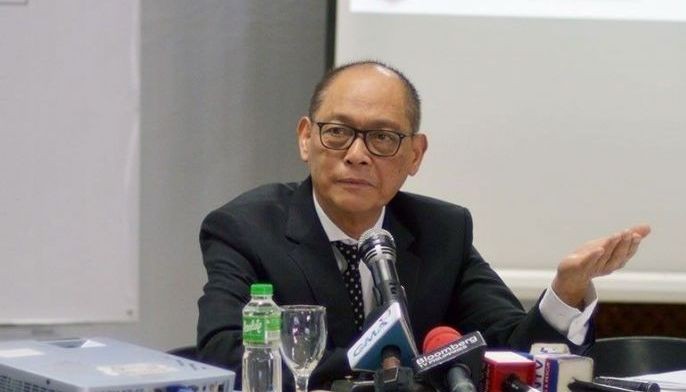MANILA, Philippines (Update 2, 11:14 a.m.) — President-elect Ferdinand Marcos Jr. picked Bangko Sentral ng Pilipinas Governor Benjamin Diokno to lead his economic team as the next Finance secretary.
Marcos made the much-awaited announcement at a press conference on Thursday morning.
With his appointment to the Department of Finance, Diokno will cut short his term as BSP chief, which was scheduled to end in July 2023. Monetary Board member Felipe Medalla will serve the remainder of Diokno's term.
“It is an honor to serve the Filipino people in my current and any future capacity. I am grateful and humbled by the trust given to me by the President-elect to help his administration manage the country’s fiscal affairs,” Diokno said in a statement.
“As Finance Secretary, I will strive to continue prudently and carefully balancing the need to support economic growth, on one hand, and to maintain fiscal discipline, on the other,” he added.
A former economics professor at the University of the Philippines, Diokno, 74, has experience in both fiscal and monetary policymaking. Before becoming the country’s chief central banker, Diokno had served in several capacities under three Philippine presidents, twice as budget minister.
Under the late President Corazon Aquino’s administration, Diokno was part of the team that created the 1986 Tax Reform Program and the 1991 Local Government Code, which aimed to give local government units more autonomy in handling finances and implementing projects. At the time, he was an undersecretary at the budget department.
Before the ouster of ex-President Joseph Estrada, Diokno served as his budget chief from 1998 to 2001. Diokno was widely regarded to have reformed fiscal management, including instituting “what you see is what you get” or WYSIWYG that made it easy for taxpayers’ funds to be disbursed.
Years later, he was handpicked by President Rodrigo Duterte to lead the Department of Budget and Management again, before being elevated to his current position as BSP governor in March 2019.
"Following through with the previous admin's policy direction and priorities should be easier with Dr. Diokno in the helm," Jun Neri, lead economist at Bank of the Philippine Islands, said.
"Transitioning should be fairly simple. I guess the crucial question is whether Dr. Diokno can be to Marcos Jr. what Carlos Dominguez was to Rodrigo Duterte," Neri added.
Diokno will succeed Carlos Dominguez III, who pushed for bold tax reforms under the Duterte administration and headed the economic team that shored up the economy to recovery from the pandemic.
Meanwhile, Diokno, who was widely perceived as a dovish central bank governor, ushered in an aggressive monetary policy easing to support the economy amid the health crisis.
The easing cycle ended in November 2020, with the key rate hitting an historic-low of 2%. Under Diokno’s watch, the BSP also extended loans to the national government to fund a costly pandemic response, and bought government securities in the bond market to ensure the smooth operations of financial markets amid heightened risk aversion.
With the economy showing signs of a solid rebound, the BSP this month hiked its key rate for the first time in over three years as the central bank’s focus shifts from sustaining recovery to fighting an uncomfortably high inflation that is threatening to erase the gains made in the past year.
But despite his new job, Diokno will still stay in the Monetary Board as the finance chief occupies one of the seven seats in the powerful BSP body.
Before leaving office, Dominguez left his successor a “fiscal consolidation” plan to help the new president tackle the state’s huge debt pile and large budget deficit. Should the Marcos administration adopt the plan, Filipinos would pay new taxes in the next three years while some tax exemptions will be limited.


